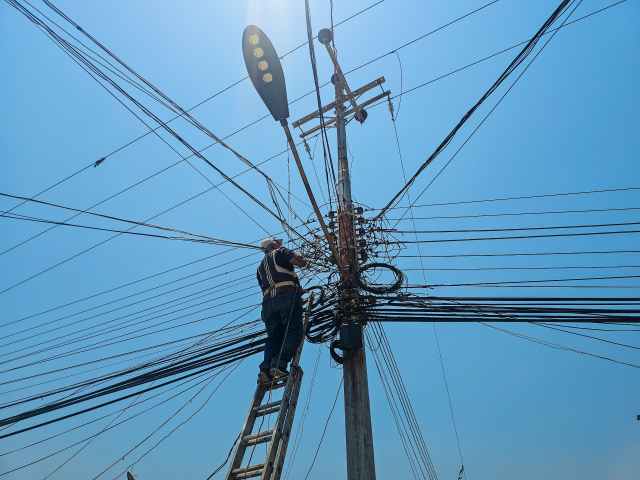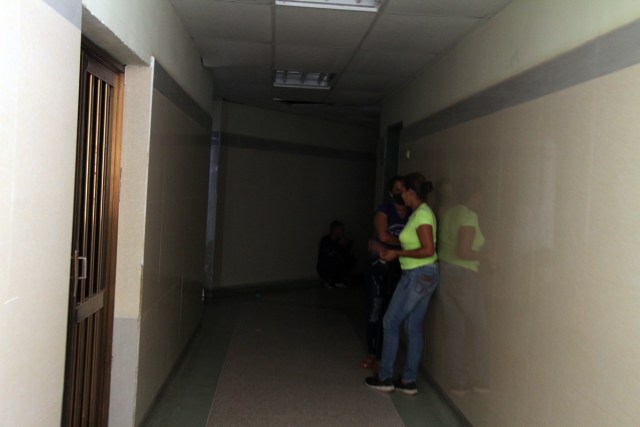
The debasement of the electrical system in eastern Venezuela has a pervasive negative impact on people’s daily life, paralyzing the daily routines and labor of those who live in this region of the country.
Dexcy Guédez, Jefferson Civira and Victor Federico González / Corresponsalía lapatilla.com
“They only say that this is the ‘Plan de Adminstración de Cargas’ (PAC, Load Administration Program), and with that they have us screwed. These unannounced electrical power cuts are expected to last from 3 to 5 hours, because maybe they forget to reconnect the system, we are not able to work, and we can do nothing,” says Frank Díaz, resident of Anzoátegui.
And in fact: “when two days go by without our electricity being cut off, we are afraid, because what is coming is hard. One lives in anxiety, without having anyone to complain to. It is unfair that our electrical system is so poor,” says María Velderrey, who gets frustrated every time there is a power outage because her activities as a hairdresser are suspended and she stops earning money.
Although plans such as hydrocarbon fuel-dependent thermoelectric plants have been proposed, these are not producing energy. The wind energy parks that had been proposed for this region of the country were never installed.
In cities like Lechería, Mayor Manuel Ferreira suspended by decree the granting of permits to establishments that cannot generate their own electrical energy to avoid overloads in the collapsed distribution network.
The situation generates problems of stress, insecurity, anguish and other problems derived from the instability in the electrical service that paralyzes the lives of all citizens in eastern Venezuela.
Uncertainty reigns among citizens

For psychologist Mario Salón, the deficiencies of the electrical service generate instabilities in people’s daily lives. “Every time there is a power outage, many people who have a pre-established schedule obviously have to rethink part of that schedule and in many cases this generates uncertainty and emotional instability, since it is likely that people are in a hurry or have some type of important task or extra-work activity, including rest, and the unscheduled power outage, generates certain discomfort, not only physical, but also emotional due to the distortion that is generated,” he indicated.
When asked about strategies to apply to deal with the stress and anxiety generated by these situations, he indicated that we must “understand and accept that it is not up to us whether these power outages exist or happen.” He highlighted the importance of assimilating that one does not have control over the instability of the service, but considered it essential that the emotional part be managed.
On the other hand, he stated that the most affected are people who are in an active working stage, between 25 and 50 years old. “Children are not so affected emotionally because they have toys, video games and can do any other type of activities, while older adults are not so heavily affected, because they have other activities or responsibilities that are not so directly related to electricity,” Salon explained.
He recommended that Venezuelans have a plan B to deal with power outages and continue with other activities while the blackouts last, in addition to learning to manage emotions.
Not even the hospitals are spared in Monagas State

Although the electricity outages in the city of Maturín, capital of the Monagas State, are a headache, in the rest of the 12 municipalities the situation is even worse. The interruption of the electrical energy service is much more frequent in rural areas, and includes hospitals, outpatient clinics and Comprehensive Diagnostic Centers (CDI).
In the case of ‘Punta de Mata’ in the Ezequiel Zamora municipality to the west of Maturín, the Luis González Espinoza Hospital remains in the dark, since the emergency power plant is not active. The councilor for that jurisdiction, Antonio Briceño, denounced that blackouts of at least three hours occur daily, although this does not affect the X-ray and laboratory services, since these haven’t been working for some time now.
A similar situation occurs in the Dr. José Antonio Urrestarazu Hospital in Caripe, in the north of the state, which although it has an electric plant, the lack of diesel fuel prevents it from being started when blackouts occur, which are much more frequent and prolonged in this town.

Both healthcare centers do not provide nephrology services, so all kidney patients are treated in one of the three dialysis centers in Maturín, where the lapatilla.com team was able to confirm that they have power plants, and fortunately at If the electricity fails, patient care is not interrupted.
In the CDIs (Government run diagnostic centers), which at some point were the banner of political propaganda for Chavismo, the panorama is not at all different, since when a power outage occurs, everything goes dark and the few services they provide stop working. The exception can only be made in the part of physical therapy and rehabilitation that they can continue to provide, but in the middle of a hot room.
Studies and productivity in check in Sucre

The suspension of the electrical service without prior notification from ‘Corpoelec’ (Government run national electrical monopoly) not only affects Cumaná, capital of Sucre State, but also all the other 14 municipalities that make up this eastern state suffer from this problem.
In the case of the Cajigal municipality, service cuts are applied daily and yet the people may experience four to five interruptions in one single day. “The reality of Cajigal is catastrophic, everything is abrogated to the ‘Pico y Poda’ Plan,” said a citizen.
In the capital of Sucre, the people of Cumana report significant losses of household appliances. Such is the case of Andrea Rojas, a resident of Villa Cristóbal Colón. “We have been without power for up to four hours. It affects me in my studies when I am doing work and I can’t finish on time. My refrigerator, an air conditioner, and another air conditioner in my room, the only one that worked, have been damaged and well, this is sad,” she said.
The reality of Bárbara Guevara, a resident of Los Chaimas and owner of the New York Cookies business, is not different from that of Rojas. “I live in Los Chaimas and there’s a blackout every day without fail, absolutely every day, for like two or three hours. I have a cookie business and my oven is electric, every time the power goes out I lose sales, and I always pray to God that a blackout doesn’t screw up my oven, just like they screwed up my air conditioning compressor,” she stated.
It should be noted that it is a scenario that is repeated in the different parishes that make up the capital of Sucre State.
Commerce and tourism suffer in Margarita island

In the state of Nueva Esparta, that is the tourist destination par excellence in the country, the electricity crisis is making its effects felt in both the commercial and tourist areas, both the basis of the regional economy.
Juan Carlos Meleán, Second Vice President of ‘Fedecámaras – Nueva Esparta’ Chamber of commerce), said that for example, in the case of tourism, which was urged to invest in electrical power plants so that it could guarantee the energy supply in hotels and other tourist service providers, the continuous use of power plants, installed in principle to respond only to emergencies, accelerates their deterioration, which is why they begin to fail.
“This is how we find that suddenly the power goes out, the power plant did not start because it has a fault or it is over its service life,” explained Meleán, who is a specialist in the matter.
Regarding commerce, he indicated that although most do not have the possibility of having those backup systems, in the event of a blackout or failures of this nature, commerce practically comes to a standstill and has to close its doors.
“If they are not in Sambil or Parque Costazul that have power plants, they must ‘bajar la Santamaría’ (Close doors, cease operating), because they do not have a backup system. Then the activity is practically canceled,” stressed the member of the regional business leadership.

